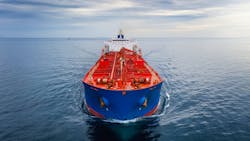Cummins Selected by UK Government for Methanol Vessel Retrofit Project to Decarbonize Maritime Industry
Cummins has announced its proposal has been selected to jointly develop a Methanol Kit for its QSK60 engine as part of the Zero Emission Vessels and Infrastructure (ZEVI) competition, funded by the UK Government and delivered in partnership with Innovate UK.
As one of the top ten projects chosen, Cummins will collaborate with a major UK port and operators to develop, deploy, and operate clean maritime technology solutions on the path to decarbonize and reduce the overall greenhouse gas footprint.
“This project, with its focus on the conversion of existing engine installations, offers a seamless transition between today and the future builds of new, cleaner technology ships,” added Molly Puga, Cummins Executive Director – Strategy, Product Planning & Digital. “It dismisses the need for a major vessel overhaul and creates an immediate positive impact on carbon emissions reduction in all environmental and operating conditions, ultimately helping the maritime sector meet our global climate needs.”
Cummins and its project stakeholders – Ocean Infinity, the Aberdeen Harbour Board, and Proman AG – will use the £4.4M in total funding to deploy a UK-designed and built methanol conversion kit for a high-horsepower marine internal combustion engine. This will offer the UK an important foothold in enabling the transition to cleaner maritime fuels.
Projected to be completed in Q2 2025, the project is expected to reduce CO2 emissions by 50% for offshore operations of vessels with NOx, Sox, and PM at levels considerably below those emitted by conventional fuel.
“Cummins is honored to be selected by the UK Government in support of this dual fuel project that aligns well with our bridge technologies strategy,” said Mark Bargent, Cummins Technology Architecture and Planning Director. “We remain committed to helping the maritime sector reach its goal of 50% reductions in greenhouse gas emissions by 2050, as required by the IMO. To get there, ship builders need a roadmap for their decarbonization plans.”
As part of the consortium:
- Ocean Infinity will provide an Armada 78m lean-crewed hybrid offshore service vessels for Cummins to design, develop, and test the dual fuel hydrotreated vegetable oil and methanol technology.
- The Port of Aberdeen will offer its facilities and services for testing the vessels.
- Proman AG will lend its long-standing global expertise in methanol production and development of ultra-low carbon methanol production.
About the Author
EnergyTech Staff
Rod Walton is head of content for EnergyTech.com. He has spent 17 years covering the energy industry as a newspaper and trade journalist.
Walton formerly was energy writer and business editor at the Tulsa World. Later, he spent six years covering the electricity power sector for Pennwell and Clarion Events. He joined Endeavor and EnergyTech in November 2021.
He can be reached at [email protected].
EnergyTech is focused on the mission critical and large-scale energy users and their sustainability and resiliency goals. These include the commercial and industrial sectors, as well as the military, universities, data centers and microgrids.
Many large-scale energy users such as Fortune 500 companies, and mission-critical users such as military bases, universities, healthcare facilities, public safety and data centers, shifting their energy priorities to reach net-zero carbon goals within the coming decades. These include plans for renewable energy power purchase agreements, but also on-site resiliency projects such as microgrids, combined heat and power, rooftop solar, energy storage, digitalization and building efficiency upgrades.
